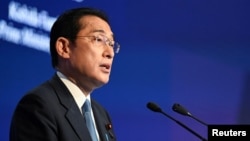Japanese Prime Minister Fumio Kishida unveiled a plan to enhance the country’s military capability and assist Southeast Asian countries with maritime security during his Friday keynote address in Singapore before the Shangri-La Dialogue, Asia’s premier security summit.
“Ukraine may be East Asia tomorrow,” he said, suggesting the Taiwan issue could pose an imminent threat to peace across East Asia. Kishida then made it clear that typically dovish Tokyo is planning to acquire counterstrike weapons to defend against potential attacks.
“The Kishida Vision for Peace will strengthen Japan’s diplomacy and security,” he said, reiterating a commitment Tokyo made earlier this week to drastically increase defense spending over the next five years, including aid packages earmarked for supplying Southeast Asian countries with patrol boats. Several of those countries have rival claims against China over parts of the South China Sea.
China's state-run Global Times news outlet criticized the Japanese initiative in an opinion piece published just hours before Kishida’s speech. “Japan uses the pretext of 'preventing a crisis like the Russia-Ukraine crisis from happening in Asia' to legitimize its move to collude with NATO and convince regional countries to serve its goal of targeting China,” it said.
The Japanese leader also expressed concern over North Korea, which has carried out at least 18 rounds of weapons tests this year to showcase its evolving nuclear and missile arsenals. He also expressed disappointment that the U.N. Security Council had failed to act against Pyongyang because of the ability of members to veto resolutions.
There is a strong debate in Japan about allocating 2% of the national budget for military expenditure. Analysts see the move as an attempt by Tokyo to come out of the shadow of the U.S. after having kept away from military spending since the end of World War II.







